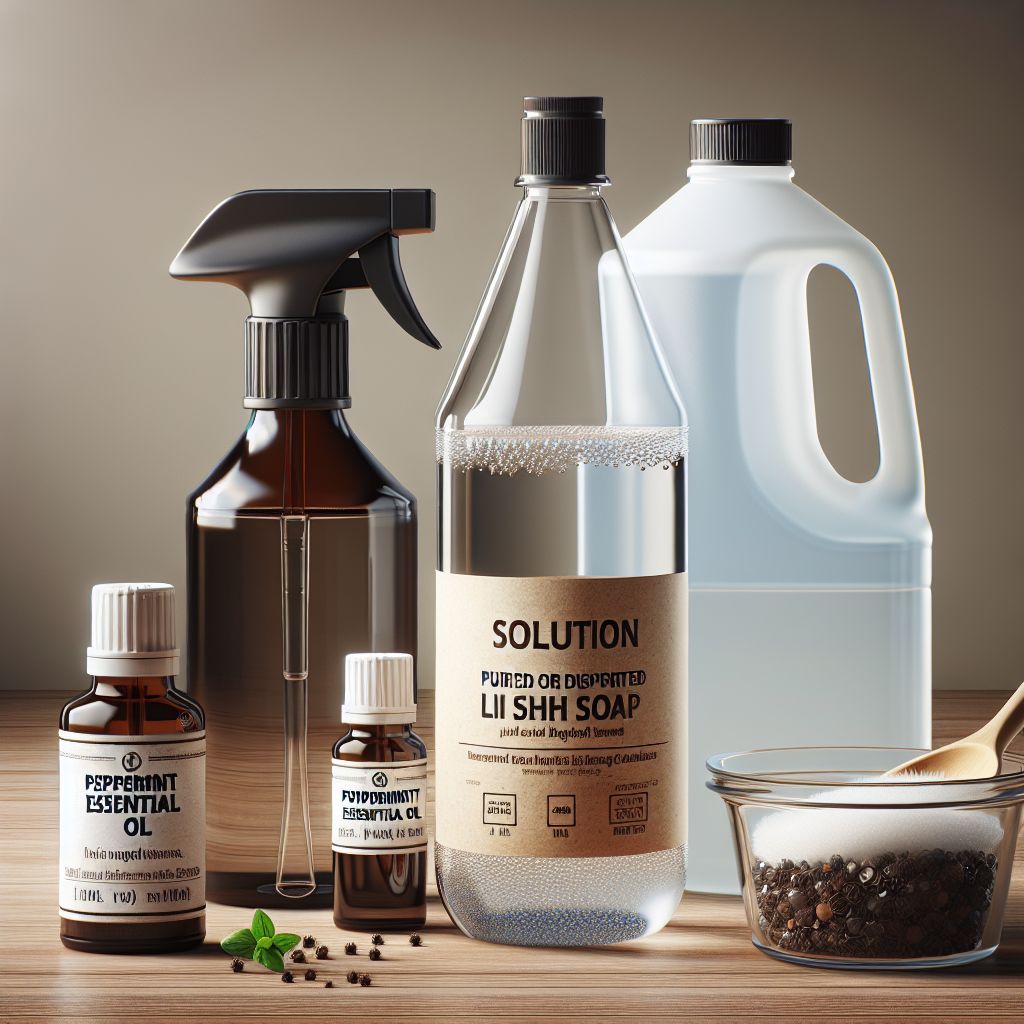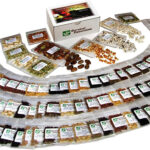
Welcome to the world of organic gardening, where the power of nature is harnessed to foster a thriving garden ecosystem. Today, I’m going to share with you the incredible benefits of peppermint oil and how you can use it to protect your survival garden from pests in a safe and natural way.
Article-at-a-Glance
Peppermint oil is a natural pest repellent that can protect your garden without the use of harsh chemicals.
Identifying the specific pests in your garden is crucial to effectively using peppermint oil as a deterrent.
A simple recipe for a homemade peppermint oil spray includes water, a small amount of dish soap, and peppermint essential oil.
Regular application, particularly after rain or heavy winds, is key to maintaining the repellent effect of peppermint oil.
Companion planting with peppermint can enhance the overall health of your garden and create a more robust defense against pests.
Whether you’re a seasoned gardener or just starting out, the use of peppermint oil is a game-changer in the fight against garden pests. Let’s dive in and explore how you can harness this powerful, minty ally.
Unlocking the Power of Peppermint Oil in Your Garden
Peppermint oil, derived from the peppermint plant, is more than just a refreshing aroma. It’s a potent organic tool that repels a wide range of garden pests, from aphids to rodents. But how does it work? The strong scent of peppermint oil is overwhelming to the sensitive olfactory receptors of many garden pests, effectively masking the attractant scents of your precious plants.
Natural Advantages of Peppermint Oil
The use of peppermint oil in the garden comes with a host of advantages. Most importantly, it’s non-toxic, making it safe for you, your family, and beneficial insects like bees and ladybugs. It’s also highly versatile, as it can deter a variety of pests with just a few drops. Besides that, peppermint oil is cost-effective; a little goes a long way, which means you can protect your garden without breaking the bank.
Identifying Your Garden’s Pests
Before you can harness the full potential of peppermint oil, you need to know who the intruders are. Take a stroll through your garden and look for telltale signs of pest activity. Chewed leaves might indicate the presence of caterpillars, while small mounds of soil could signal a mole problem. Once you’ve identified the pests, you can tailor your peppermint oil strategy to address the specific challenges they present.
Remember, the goal is not to eliminate all insects but to maintain a balanced ecosystem where beneficial insects thrive and harmful pests are kept at bay. Therefore, identifying pests accurately is crucial to achieving this balance.
Now that you’ve pinpointed the pests plaguing your garden, let’s move on to creating an effective peppermint oil spray that will keep those unwelcome guests at bay.
Creating Your Peppermint Oil Pest Control Spray
Gathering the Ingredients
To make your own
peppermint oil pest control spray, you’ll need:
A clean spray bottle
Purified or distilled water
Unscented liquid dish soap
High-quality peppermint essential oil (Mentha piperita)

Choosing the right peppermint oil is crucial. Look for 100% pure Mentha piperita for its high menthol content, which is the main component that repels pests.
Step-by-Step Mixing Guide
Mixing your peppermint oil spray is a breeze. Here’s a simple guide:
Fill the spray bottle almost to the top with water.
Add a squirt of dish soap. This helps to emulsify the oil and water, ensuring they mix well.
Add 10-15 drops of peppermint oil. If you’re dealing with a severe pest infestation, you may increase the oil concentration slightly, but do so cautiously.
Shake well to combine all the ingredients.
Your peppermint oil spray is now ready to defend your garden. But how should you use it?
Applying Peppermint Oil Effectively Against Pests
Strategic Spray Timing
Timing is everything when it comes to pest control. The best time to apply your peppermint oil spray is in the early morning or late afternoon, avoiding the heat of the day when plants are most stressed. Also, after rainfall or strong winds, reapplication is necessary as these elements can dilute or wash away the oil.
Target Areas for Application
Focus on areas where pests are most active, and consider using peppermint oil spray as an organic solution.
Spray the undersides of leaves where insects like to hide.
Coat the stems and base of plants to deter soil-dwelling pests and those that climb.
Don’t forget to spray around the perimeter of your garden as a first line of defense.
Use the spray consistently, every week or so, to maintain its effectiveness. Keep an eye on your plants for any signs of distress, as some may be sensitive to oil sprays.
Maximizing Peppermint Oil Benefits in a Survival Garden
Peppermint oil is not only useful as a spray; it can also play a role in the design of your garden. Let’s look at how companion planting with peppermint can further enhance your pest control efforts and the overall health of your garden.
Companion planting is the practice of placing certain plants in close proximity to each other for mutual benefit. In the case of peppermint, its strong scent can mask the presence of your vegetable plants, making it harder for pests to locate their targets.
Companion Planting with Peppermint
When considering companion planting with peppermint, remember:
Peppermint can be invasive, so it’s often best to plant it in containers to prevent it from overtaking your garden.
Place peppermint pots near plants that are particularly susceptible to pests.
Peppermint also attracts beneficial insects, such as predatory wasps and pollinators, which can aid in pest control and pollination.
Companion planting with peppermint is a proactive step you can take to create a robust, self-sustaining ecosystem in your garden.
Maintaining a Healthy Garden Ecosystem
A healthy garden ecosystem is your best defense against pests. This means fostering a diverse range of plants, encouraging beneficial insects, and practicing crop rotation. Remember, peppermint oil spray is just one tool in your arsenal. Use it alongside other organic practices for a garden that’s not only productive but also resilient.
DIY Tips and Tricks for Peppermint Oil Use
Storage and Shelf Life of Peppermint Spray
To ensure your peppermint spray remains potent, store it in a cool, dark place when not in use. The shelf life of your homemade spray is typically a few weeks, so make small batches to maintain effectiveness.
Combining with Other Natural Remedies
Peppermint oil works well in tandem with other natural remedies. For instance, neem oil can be added to your spray for enhanced pest-fighting power. Here’s a quick combination you can try:
Add 5 drops of neem oil to your peppermint spray mixture.
Shake well before each use.
Apply as you would the standard peppermint oil spray.
This combination not only repels pests but can also help combat fungal diseases that may affect your plants.
Now that you’re armed with knowledge and a natural solution, it’s time to take control of your garden’s health. Embrace the power of peppermint and watch your survival garden flourish, naturally and sustainably. And if you’re looking to expand your organic gardening toolkit, don’t forget to explore other natural options available at Survival Essentials, where you’ll find a range of products to support your journey toward a self-sufficient garden.
FAQ’s
Can peppermint oil harm beneficial garden insects?
One of the most significant concerns when using any pest control method is the potential impact on beneficial insects. Peppermint oil, when used correctly, is selective in its action. It primarily repels harmful pests due to its strong scent. Beneficial insects, such as bees and butterflies, are not as sensitive to the smell and are less likely to be deterred. However, it’s important to apply peppermint oil sparingly and avoid direct application on flowers to minimize any potential disruption to these helpful pollinators.
It’s also worth noting that peppermint oil can help attract predatory insects that feed on common garden pests. Lacewings and ladybugs, for example, are not repelled by peppermint and can help maintain the natural balance of your garden’s ecosystem.
How often should I reapply peppermint oil spray?
The frequency of application largely depends on factors such as rainfall, garden size, and the severity of the pest problem. As a general rule, reapply peppermint oil spray every one to two weeks for maintenance. If you experience heavy rain or notice an uptick in pest activity, you may need to apply it more frequently. Always observe your plants after spraying to ensure they respond well to the treatment and adjust your application schedule accordingly.
Example: After a week of using peppermint oil spray, I noticed fewer ants on my garden paths and around my vegetable plants. However, following a heavy rainstorm, the ant activity increased, prompting me to reapply the spray. The key is consistent observation and timely reapplication.
Consistency is key to keeping pests at bay, so stick to a regular spraying schedule. Also, consider the time of day when applying the spray—early morning or late evening is best to avoid potential harm to beneficial insects and to reduce the chance of leaf burn during the hottest part of the day.
Remember, the goal is to create an environment that’s inhospitable to pests but welcoming to beneficial species. With peppermint oil, you’re choosing a method that aligns with this balance, promoting a healthy, thriving garden.
Is peppermint oil safe for all plants?
While peppermint oil is generally safe for most plants, some may be sensitive to oil-based sprays. It’s always best to perform a patch test on a small area of the plant before applying it more broadly. If there’s no adverse reaction after 24-48 hours, you can proceed with applying the spray to the rest of the plant. Be cautious with seedlings and young plants, as their delicate tissues may be more susceptible to damage.
Can I plant peppermint in the garden instead of using the oil?
Planting peppermint in your garden is an excellent way to harness its pest-repellent properties. However, peppermint can be quite invasive and may quickly spread if not contained. If you choose to grow peppermint, consider planting it in pots or designated areas where it won’t encroach on other plants. Not only will this help manage pests naturally, but you’ll also have a fresh supply of peppermint for culinary use.
When peppermint is planted in the garden, it releases its aromatic oils into the surrounding soil and air, which can help deter pests. Additionally, the physical presence of peppermint plants can provide a barrier that pests are less likely to cross.
Plant peppermint near the borders of your survival garden to create a natural pest deterrent.
Use peppermint clippings as mulch around susceptible plants for added protection.
Remember to regularly harvest and prune your peppermint plants to keep them under control and to stimulate the production of the aromatic oils that repel pests.
What other pests can be deterred with peppermint oil?
Peppermint oil is a versatile natural repellent that can deter a wide variety of pests. Here are some common garden invaders that dislike the scent of peppermint:
Aphids
Spider mites
Squash bugs
Cabbage loopers
Fleas
Mosquitoes
Mice
By using peppermint oil in your garden, you’re not only targeting specific pests but also creating an overall environment that is less inviting to a broad spectrum of insects and small rodents. This holistic approach to pest control is what makes peppermint oil such a valuable asset in your organic gardening toolkit.
In conclusion, peppermint oil is a powerful, natural tool for organic pest control in your survival garden. With its pleasant aroma and non-toxic properties, it provides a safe alternative to chemical pesticides, protecting your plants while preserving the natural balance of your garden’s ecosystem. By identifying pests, applying peppermint oil correctly, and maintaining a consistent treatment schedule, you can enjoy a lush, productive garden that’s resilient against pests. So, take the first step towards a more sustainable gardening practice and Get Started with peppermint oil today!







Leave a Reply